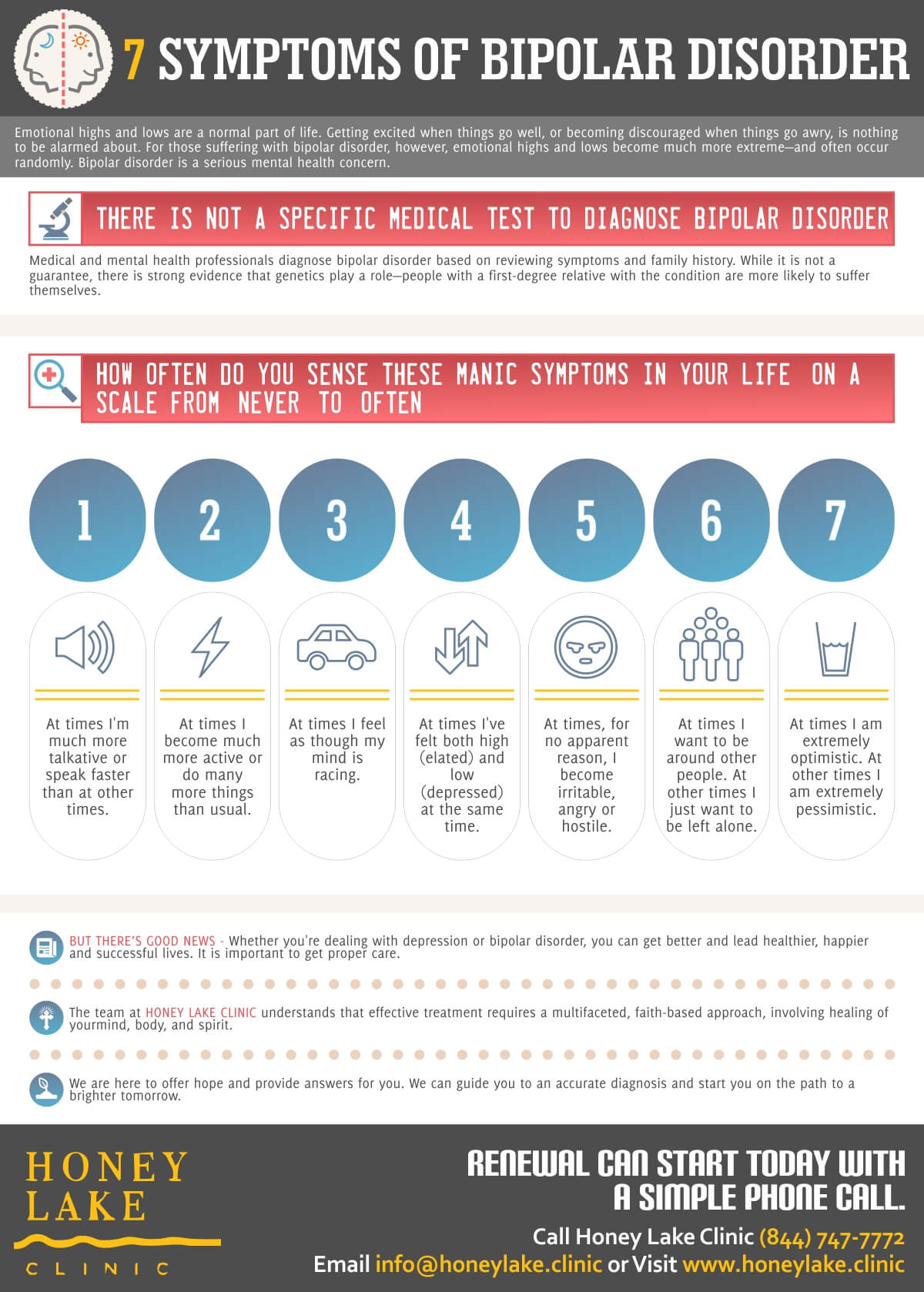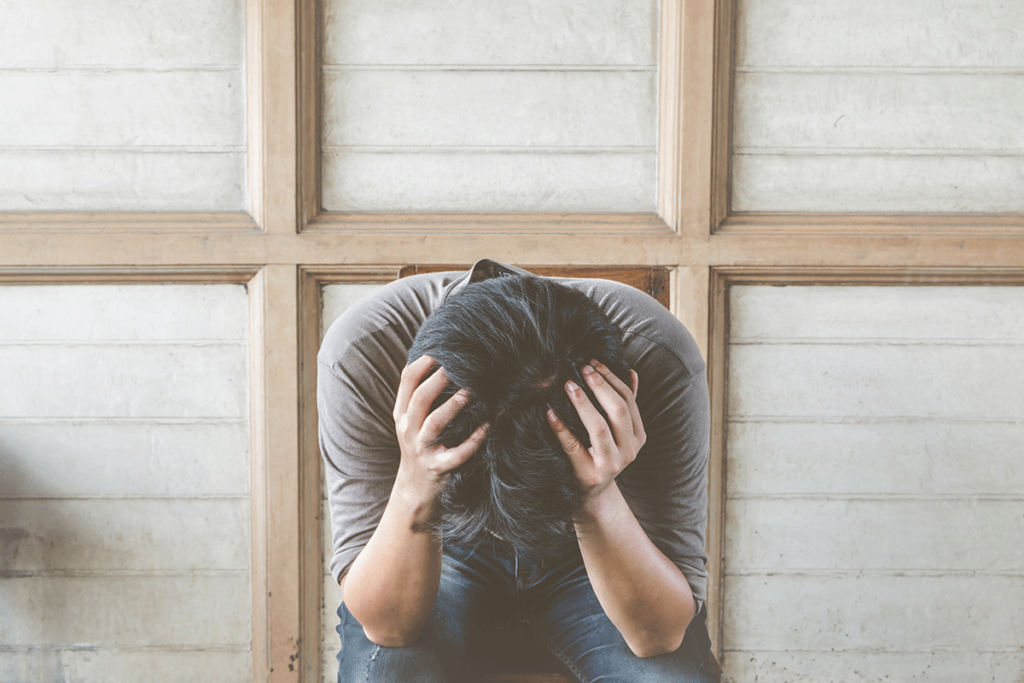Emotional highs and lows are a normal part of life. Getting excited when things go well or becoming discouraged when things go awry is nothing to be alarmed about. For those suffering from bipolar disorder, however, emotional highs and lows become much more extreme—and often occur randomly. Bipolar disorder is a severe mental health concern. If you or someone you love needs bipolar disorder treatment, contact Honey Lake Clinic at 888.428.0562 today.
How to Diagnose Signs of Bipolar Disorder
There is no specific medical test to diagnose bipolar disorder.
Medical and mental health professionals diagnose bipolar disorder based on reviewing symptoms and family history. While it is not a guarantee, there is strong evidence that genetics play a role—people with a first-degree relative with the condition are more likely to suffer themselves.
Bipolar disorder is a form of depression. As such, many of the symptoms of depression and bipolar disorder are similar. Mental health professionals look for manic episodes in addition to depression symptoms as a key to identifying bipolar disorder.
Signs of Bipolar and Screening Questions
How often do you sense these manic symptoms in your life, on a scale from ‘never’ to ‘often’?
- At times I’m much more talkative or speak faster than at other times.
- At times I become much more active or do many more things than usual.
- At times I feel as though my mind is racing.
- At times I’ve felt both high (elated) and low (depressed) at the same time.
- At times, for no apparent reason, I become irritable, angry or hostile.
- At times I want to be around other people. At other times I just want to be left alone.
- At times I am extremely optimistic. At other times I am extremely pessimistic.
If your answers lean towards ‘often’ on two or more of these questions, take this seriously. We can help. To speak confidentially with a team member, call 888.428.0562.
A combination of manic episodes with depression symptoms may be indicative of bipolar disorder. The manic and depressive phases of bipolar disorder don’t necessarily follow a pattern. You could have several bouts of depression before you have a manic phase.

7 Symptoms of Bipolar Disorder
Let’s delve deeper into understanding the key signs that could indicate the presence of bipolar disorder, aiding in early detection and management:
- Extreme mood swings – People with bipolar disorder often experience intense and sudden shifts in their mood, from extreme highs (mania) to extreme lows (depression).
- Changes in energy levels – During manic episodes, individuals may feel a surge of energy and engage in impulsive or risky behaviors. In contrast, during depressive episodes, they may struggle with feelings of fatigue and lack of motivation.
- Difficulty with concentration – Bipolar disorder can make it challenging to stay focused or complete tasks during both manic and depressive episodes.
- Sleep disturbances – Shifts in sleep patterns, such as sleeping too much or not enough, are common among those with bipolar disorder.
- Loss of interest in activities – People with bipolar disorder may experience sudden loss of interest in activities they once enjoyed, even during manic episodes.
- Irritability and agitation – Rapid changes in mood can lead to irritability and agitation, making it difficult for individuals to maintain relationships or handle daily stressors.
- Impaired judgment – During manic episodes, people with bipolar disorder may engage in impulsive or reckless behaviors, disregarding potential consequences.
These symptoms may vary in severity and can profoundly impact an individual’s daily life. If you or a loved one are experiencing any of these symptoms, it is important to seek professional help for proper diagnosis and treatment.
Benefits of Treatment for Bipolar Disorder
Early diagnosis and treatment can help people with bipolar disorder lead healthy, productive lives. Without proper treatment, individuals may experience significant disruptions in their personal and professional lives. Treatment options include therapy, medication, and lifestyle changes:
- Therapy – Psychotherapy or talk therapy is often recommended for those with bipolar disorder. A therapist can help individuals better understand their mood swings and develop coping strategies. They can also provide support during difficult times and help address any underlying issues that may contribute to bipolar disorder.
- Medication – A combination of medications, such as mood stabilizers and antidepressants, is often used to treat bipolar disorder. These medications can help reduce symptoms and prevent future episodes. Working closely with a doctor and following their recommended treatment plan is important.
- Lifestyle changes – Making positive lifestyle changes can also be beneficial in managing bipolar disorder. This can include maintaining a regular sleep schedule, reducing stress, and avoiding drugs and alcohol. Support from family, friends, and support groups can also play a crucial role in managing the condition.
Remember, recognizing and acknowledging the symptoms of bipolar disorder is the first step towards seeking help and improving your mental health.
Getting a Diagnosis with Honey Lake Clinic in Florida
A proper diagnosis—knowing whether you are suffering from depression or bipolar disorder is essential. The treatment of the two can be quite different.
But there’s good news: Whether you’re dealing with depression or bipolar disorder, you can get better and lead healthier, happier, and successful lives. It is essential to get proper care.
At Honey Lake Clinic, our experienced staff, licensed therapists, psychologists, and psychiatric specialists can guide you to an accurate diagnosis and start you on the path to health. The team at Honey Lake Clinic understands that effective treatment requires a multifaceted, faith-based approach involving healing your mind, body, and spirit.
We are here to offer hope and provide answers for you. We can guide you to an accurate diagnosis and start you on the path to a brighter tomorrow.
